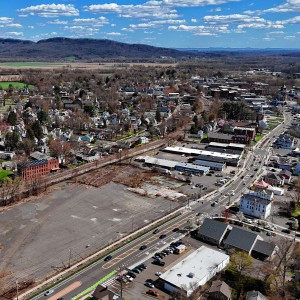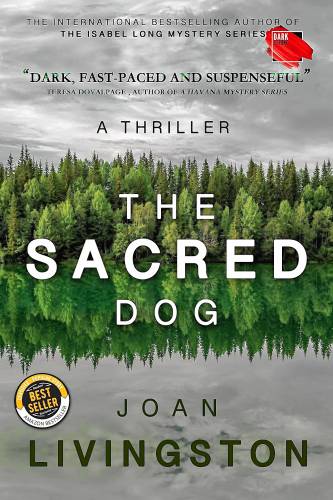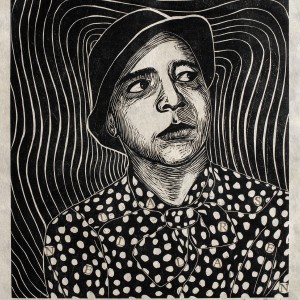Book Bag: ‘The Sacred Dog’ by Joan Livingston; ‘Mud Pie’ by Lauren Arienzale
| Published: 02-02-2024 11:52 AM |
The Sacred Dog
By Joan Livingston
Darkstroke Books
Franklin County author Joan Livingston, a former reporter and editor who once covered the Hilltowns for the Gazette, has used her experience to create a series of mystery novels set in similar towns, where life centers around a few gathering locales like a general store or the local bar — and where secrets often fester for years.
Livingston started with a series centered on Isabel Long, a longtime journalist turned amateur private investigator who draws on her reporting skills and small-town connections to solve cold cases in the hills of western Massachusetts.
In some more recent standalone books, Livingston sketches other portraits of small-town New England life, including “The Sacred Dog,” set in the town of Holden, where Frank Hooker owns the local bar — The Sacred Dog, named after a canine he had rescued.
Frank, a lifelong townie, gets along with pretty much everyone except Al Kitchen, a fellow working class guy who was a great baseball player in high school but now, in perhaps his late 30s, has pretty much gone to seed.
Frank blames Al for the death of his younger brother, Wes, in a car accident years ago, even though Wes, Al’s best friend, was drunk at the time and at the wheel. Al, though an admitted hell-raiser as a younger man, has long protested his innocence and resents Frank’s blame; the issue smolders between them.
The story, set in the 1980s, is built around some of the small and often funny details of small-town New England life that Livingston brought to her Isabel Long mysteries, like the book’s opening scene, where members of two softball teams are waiting out a rainstorm.
Article continues after...
Yesterday's Most Read Articles
 More than 130 arrested at pro-Palestinian protest at UMass
More than 130 arrested at pro-Palestinian protest at UMass
 Public gets a look at progress on Northampton Resilience Hub
Public gets a look at progress on Northampton Resilience Hub
 Northampton bans auto dealerships near downtown; zone change won’t affect Volvo operation on King Street
Northampton bans auto dealerships near downtown; zone change won’t affect Volvo operation on King Street
 UMass basketball: Bryant forward Daniel Rivera to be Minutemen’s first transfer of the offseason
UMass basketball: Bryant forward Daniel Rivera to be Minutemen’s first transfer of the offseason
 Town manager’s plan shorts Amherst Regional Schools’ budget
Town manager’s plan shorts Amherst Regional Schools’ budget
 Police respond to alcohol-fueled incidents in Amherst
Police respond to alcohol-fueled incidents in Amherst
One of them is sponsored by a sanitation company, with the company’s slogan on their shirts: “You Dump It, We Pump It.”
And two of the team’s players are brothers who work at a local dairy farm, good-natured guys in their late 20s who still live with their mother: “No girlfriends, but no wonder since they always smelled of fresh cow manure, regardless of how clean they were.”
Things get complicated when Frank’s ex-wife, Verona, returns from Florida with their young daughter, Crystal, after being away for three years. Verona had gone to school with Al and Wes, and coming back might mean her having to face a dark secret that concerns Al and her ex.
Al’s got plenty of other baggage. He lives with his grandmother, who he watched suffer abuse for years from her now-dead husband, and he’s developed a drinking problem. That and his growing resentment toward Frank may be enough to create fresh trouble in Holden, especially with Verona’s return.
“Oh, what a tangled web,” writes one reviewer. “A brilliant story exploring rivalry, bad blood and the power of secrets.”
Mud Pie: A Poetry Collection
By Lauren Arienzale
Lauren Arienzale, a 2020 graduate of Hampshire College, has worn a number of hats in recent years: farm hand, college student and now doctoral student in psychology, office assistant for a nonprofit organization, and poet.
“Mud Pie,” a collection Arienzale published last year, is, as she describes it, “an unapologetic deep dive into grief, deconstruction (religious and otherwise), and the seemingly endless failures and shortcomings that come with one’s second decade.”
Be that as it may, the free verse and occasional prose poems (written almost entirely in lowercase) in “Mud Pie” also speak to the author’s effort to find community where she can — she’s continued to live in the Valley — and to make art a key part of her life.
Work like “For My Sanity” touches on an issue any young, creative person can recognize: the desire to make art but not knowing if you’re any good at it.
“and the poetry professor in college was right, / my ending lines are strained / trying to tie themselves in silk ribbon. / I desperately want an ending, she says. / and these stories are not done speaking.”
And “Rinse and Repeat,” with its line about “the wasted potential your father / warned you about,” also speaks to the poet’s self-doubt and introspection.
“visit you own personal / graveyard of best intentions and / plans for the day. and then put all / your energy into the art that nobody / sees and into words that make no / difference to the rest of them.”
Arienzale also writes about love found and lost, and in “Deconstruction,” she discovers meaning in working on a farm. More than that: The work becomes a passage to peace of mind and a casting off of psychic wounds of the past.
“you are up to your elbows in mud, / mumbling to earthworms and ants // and suddenly // religion and shame and family names / have never been further away … you absolve your own suffering, / you create your own everlasting peace.”
And in “Home,” the poet finds the roots she’s put down in the Valley have grown deeper, even in the ending of a love affair and her concerns about the planet’s future.
“and every so often, when i forget myself, the mountains peek over / treelines and i remember myself at 18, gangly and awkward and / somehow unafraid, saying ‘see how those mountains just go on forever? / I’m going to live here forever, I can feel it.’”
Steve Pfarrer can be reached at spfarrer@gazettenet.com.



 Overlooked no more: Leverett artist’s woodcut prints celebrate remarkable women of the past
Overlooked no more: Leverett artist’s woodcut prints celebrate remarkable women of the past Arts Briefs: Dance festival and a one-woman play in Northampton, summer music fests in Easthampton, and more
Arts Briefs: Dance festival and a one-woman play in Northampton, summer music fests in Easthampton, and more Speaking of Nature: Capturing my Bermuda nemesis: The Great Kiskadee nearly evaded me, until I followed its song
Speaking of Nature: Capturing my Bermuda nemesis: The Great Kiskadee nearly evaded me, until I followed its song Easthampton author Emily Nagoski has done the research: It’s OK to love your body
Easthampton author Emily Nagoski has done the research: It’s OK to love your body
